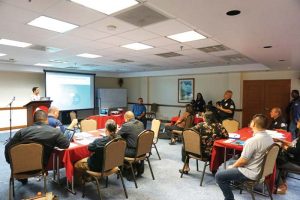Division of Customs undergoes training

Speakers from Oceania Customs Organisation Secretariat—Trade and Revenue Management adviser Laisiana Tugaga and operations manager Tevita Tupou—lead the national workshop on the Revised Kyoto Convention for the benefit of the Division of Customs management and personnel. The workshop is from Sept. 11 to Sept. 15 at the Pacific Islands Club Saipan. (Bea Cabrera)
Personnel of the CNMI Division of Customs are undergoing training on the Revised Kyoto Convention to give the CNMI a global perspective on customs laws and be a part of the world trading system in terms of main trade facilitation.
Oceania Customs Organization Secretariat operations manager Tevita Tupou said this was the first time the training was brought here.
“Basically, the idea is, we are taking CNMI legislation and mirroring it against the RKC and identifying the gaps that exist,” said Tupou. “After the identification of the gaps, we will put together a strategy on how we can narrow those gaps and work toward having CNMI accede to the RKC.”
The RKC was developed by the World Customs Organization and came into force on Feb. 3, 2006. The rationale of the RKC is to make member customs organizations around the world follow the same process and procedures so that global facilitation is achieved.
RKC also eradicates unnecessary delays or “red tape” for moving goods across borders as it promotes transparency and predictability of customs actions, standardization and simplification of goods declarations, simplify procedures for authorized persons, maximize use of technology, coordinated interventions with other border agencies, to name a few.
Division of Customs Services director Jose C. Mafnas said RKC is not yet officially implemented in the CNMI but a number of its practices are currently being done.
“But we want to be a part of it as an official member or recognized customs organization that implements the RKC so we can also be at par with the other customs globally, to raise our services to international standards,” Mafnas said. “With our growing economy, it is moving so fast that we need to move our standards up. We don’t’ want to hamper the flow of trade; we want to facilitate, be more efficient.”
“Recently, we are going over all our regulations. It took us about three months or more. We went through all our regulations to update and cut off those unnecessary processes that hamper trade, so this training is very timely,” he added.
According to Tupou, for CNMI Customs to be able to use RKC, its customs laws have to conform with current laws.
“Once the CNMI has acceded to the RKC, they have three years to be fully compliant with the RKC. The assessment process will probably take six months but once you accede, the CNMI has three years to comply,” he said.
According to Tupou, the shift in the trade landscape demands a new way of thinking—an approach from the bottom to the management.
“It requires them to work together. Not only as an institution but as players in the supply chain. It requires the whole of the CNMI to come together and make this work,” he said.
Mafnas believes the RKC will be beneficial to the CNMI.
“Our role is very important as we are the frontline agency at the ports. Everything comes through the ports…everything flows through the ports. We cannot compromise the security. We have to balance it out and we need to be ahead,” he said.
Drugs trying to penetrate the CNMI are part of the challenges that Customs face everyday.
“Crystal meth doesn’t just fall from the sky. It passes through us, so things like this coming into the CNMI, we have to gear up with equipment and training. We are not going to compromise the integrity of our enforcement in the ports and we are still making an impact at the ports,” said Mafnas.
The training will end on Friday, Sept. 15, and the RKC training by OCO will move on to Guam.



























